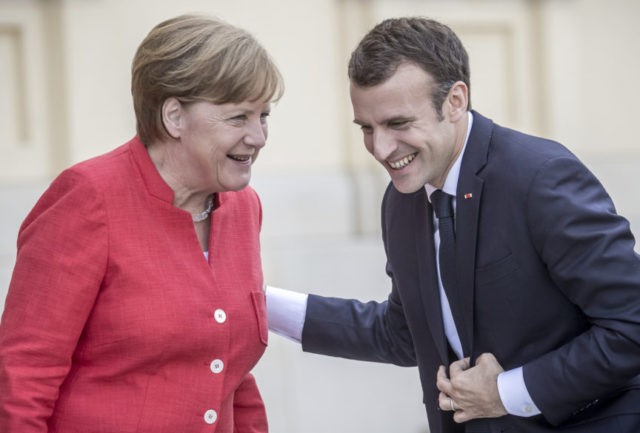BERLIN (AP) — German Chancellor Angela Merkel signaled her willingness to find compromises with France when it comes to reforming the European Union, as she hosted French President Emmanuel Macron for talks Thursday in Berlin.
Macron has outlined ambitious plans for greater economic integration across the bloc, but these have met resistance in some member countries, including among conservatives in Merkel’s party.
Merkel, who was recently confirmed for a fourth term at the helm of Europe’s biggest economy, said that at the very least she is willing to talk.
“There are of course always different starting points when it comes to the opinions of Germany and France,” she told reporters at a joint news conference with Macron. “We need open debates and in the end we need the ability to compromise.”
While Germany and France agree on the need to better protect the EU’s external borders and forge a common asylum policy, it’s unclear how much backing Macron can expect from Germany for his plans to reform the bloc’s financial structure.
In their deal to form a new German government, Merkel’s conservative party and its center-left partners agreed that Germany — like France — is prepared to pay more into the EU budget.
But Berlin has been skeptical in its response so far to the possibility of a shared budget and Merkel is lukewarm about Macron’s idea of a eurozone finance minister.
The French president made clear he won’t drop his demand for greater financial solidarity, particularly among the 19 countries that share the euro as a currency.
“No currency union can survive if there aren’t instruments for convergence,” Macron said, citing the need for a banking union — something Germany has resisted for fear of being held liable for future bailouts abroad.
Merkel said Germany would be willing to agree in the long term to a pan-European deposit insurance scheme, but insisted that solidarity shouldn’t undermine economic competitiveness among the bloc’s economies.
Macron’s flying visit to Berlin started at the unfinished Humboldt Forum, a museum that’s being built on the site where the German Kaiser’s palace stood until it was largely destroyed in World War II. The forum is named after the brothers Alexander and Wilhelm von Humboldt, two 19th-century German intellectuals who spent many years in Paris.
Both leaders noted the intentional symbolism of their visit to the building site, with Macron citing the threat posed to Europe by nationalist forces, technological change and global warming.
“In the past there were predecessors who had the strength to stand against ill winds,” he said.
Closed doors talks between Merkel and Macron later Thursday were likely to touch on Europe’s stance on the crisis in Syria and the fate of the nuclear deal with Iran.
Both leaders fly to Washington next week for separate meetings with President Donald Trump at which those issues will play a central role.
France and Germany were part of the six-nation group that negotiated the 2015 deal to stop Iran from developing nuclear weapons, and both countries are keen to prevent it from falling apart when Trump’s May 12 deadline for major changes to the pact expires.
On Syria, Berlin’s decision not to join the U.S., Britain and France in attacking suspected chemical weapons sites last week highlighted Germany’s hesitancy when it comes to military action abroad. Berlin has stressed the need for a diplomatic solution to the conflict that’s seen more than 700,000 Syrians seek refuge in Germany at considerable political cost to Merkel, who insists giving them shelter has been the right thing to do.
___
Follow Frank Jordans on Twitter at http://www.twitter.com/wirereporter

COMMENTS
Please let us know if you're having issues with commenting.